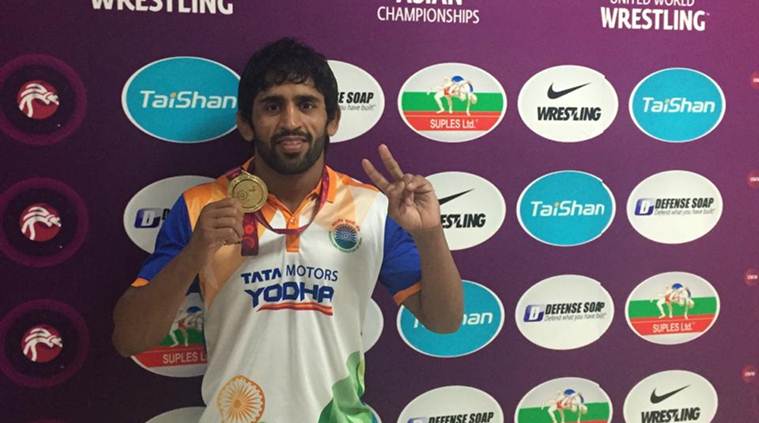
A 10-second burst was all it took for Bajrang Punia to reclaim his continental supremacy.
The Asian Championship gold in the 65kg category was his for the taking the moment world champion Takuto Otoguro had pulled out. And the way he rolled over his opponents, the result seemed a foregone conclusion. Bajrang had won all his bouts without breaking much sweat.
The final, against Kazakhstan’s Sayatbek Okassov, followed a different script. The Commonwealth and Asian Games gold medalist fell behind by four points after the first minute and Okassov maintained a 5-2 lead at the break. Even after restart, the Kazakh continued to trouble Bajrang with his swift movements and strong defence, and added two more points to his tally with a quick take down.
The match looked beyond Bajrang’s grasp. But these are the scenarios in which he thrives. The 25-year-old relies heavily on his strength. His coach, Shako Bentinidis, claims Bajrang is one of the strongest wrestlers he has worked with. “The longer a bout goes on, the better are his chances to win it,” Bentinidis had said before leaving for Xi’an, where the Championship is being held.
Why Tokyo 2020 will be tougher
Bajrang Punia may have won his second Asian Championship gold, but that does not increase his odds for an Olympic medal. His two main rivals in the 65kg category, world champion Japan's Takuto Otoguro and Kazakhstan’s Daulet Niyazbekov, skipped the tournament. Otoguro, who pulled out due to a knee injury, and Bajrang had played out what is widely regarded as Match of the Year when they faced each other in the final of the 2018 World Championship. The Japanese got the better of Indian on that occasion. In Otoguro’s absence, Bajrang’s main challenger was Niyazbekov, the defending champion who was aiming for his fourth Asian gold. He, too, skipped this meet. Bajrang's real challenge will be the World Championship later this year, where the three best 65kg wrestlers are set to compete against each other. A podium finish there, and Bajrang can make a serious claim for an Olympic medal.
On Tuesday, Bajrang proved his coach right. Trailing by five points with just 60 seconds to go, Bajrang launched a leg-attack on Okassov to take two points to bring down the deficit to 7-4. The Kazkah was visibly tired and, with seconds ticking by, Bajrang took advantage of it by combining three gut-wrench moves to take a 12-7 lead. The scoreline stayed the same when the final whistle was blown and Bajrang, who could win only a bronze medal last year, regained the gold he had won in 2017.
On his way to the final, Bajrang had conceded just one point. He had comfortably defeated Uzbekistan’s Sirojiddin Khasanov 12-1 in the semi-final. He began the day with a technical superiority win over Charles Fern of Sri Lanka and then a 6-0 win over Peyman Biabani of Iran.
Rana’s big break
Parveen Rana won his first big medal in seven years though he missed out on the top prize. Praveen, who won a bronze in this championship in 2012, lost the 79kg gold medal bout 0-3 to 2017 world championships bronze medallist Bahman Mohammad Teymouri of Iran. Rana had won a close 3-2 semifinal against Kazakhstan’s Galymzhan Usserbayev.
Satywart Kadian lost to Batzul Ulziisaikhan in the 97kg quarterfinal bout but went on to make the cut after his Mongolian rival reached the final. He won the bronze play-off 8-1 against Haobin Gao of China. — With PTI